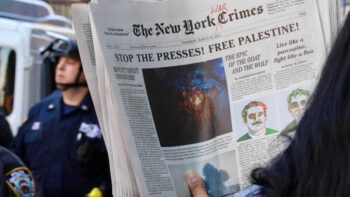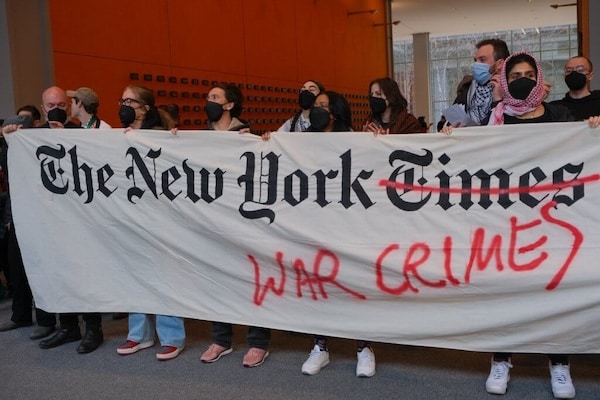On the morning of March 14, hundreds of protesters streamed into the lobby of the New York Times’ headquarters in midtown, Manhattan. Donning face masks and kuffiyehs, we unfurled a series of banners: one featuring a crossword puzzle with the words “boycott, divest, unsubscribe”; another containing the company’s logo with the word “Times” crossed out in red and replaced with “War Crimes.” After a few minutes, a chant rang out: “Free, free Palestine!” A chorus of voices responded in unison,
Free, free, free Palestine!
Just a few feet away, a very different scene unfolded. Esteemed editors and board members gathered for the annual “State of the Times” address, in which the company’s publisher, A. G. Sultzberger reflected on the journalism that the paperproduced—and the criticism it had generated—over the past year.
“In moments when the criticism is at its loudest and most fevered, we should remind ourselves why the Times receives such intense focus,” he said, perhaps to the encroaching sounds of the protesters’ chants.
Because the public reads us. Because they trust us. Because they expect a lot of us. Because they believe what we say matters. What a great privilege.
The occupation of the Times’ lobby—in which over 100 protesters were rounded up and arrested by the New York Police Department—was part of a series of coordinated actions around the city targeting the Times for its coverage of the zionist entity’s genocide in Gaza. Outside the building and across the boroughs, “paperboys” handed out fresh copies of the New York War Crimes, a bi-monthly publication of our organization, Writers Against the War on Gaza. Earlier that morning, a group of us blockaded the entrance of the company printing plant in College Point, Queens, severely limiting the circulation of that morning’s paper. And a new website was launched to house our systemic critique of the Times.
The multi-site action in mid-March marked a significant escalation in our campaign against the Times.
But why The New York Times?
All kingdoms require consent to function, for, as James Baldwin wrote in 1972, “no kingdom can maintain itself by force alone.” Consent is constructed through historical narrative, mythology which articulates why the kingdom’s dominance is justified.
A cynical, self-interested, blood-soaked history is not a sustainable narrative.
The ugly truth of U.S. empire—illegal wars, clandestine coups, napalm, fire, brimstone and the imposition of violent corporate governance—must be transformed into a palatable story. Much like the European empires of the 19th and 20th centuries cast themselves as the benevolent saviors of dark, savage worlds, the U.S. must also justify its flagrant abuses of power.
So who do they call on? Where does the empire go to launder its crimes?
Who dutifully produced a phony pretext for the brutal invasion of Iraq? Who presented the fraudulent case that Libya must be bombed? Where do the zionists turn to reinvigorate support for their increasingly sadistic and unpopular war?
The White House’s favorite accomplice, the so-called paper of record: The New York Times.
The Times is far from the only guilty institution, but it does occupy a special niche in the cultural consciousness. To paraphrase Sulzberger: the public reads and trusts the Times. When it screams across the front page that Saddam Hussein has weapons of mass destruction and is ready to use them, people listen. The paper has the power to set the course of the news. Even those who do not read the Times likely consume media influenced by its editorial choices. As Rashid Khalidi told us:
It’s the gray lady. It’s the newspaper of record. It takes itself extremely seriously. It is relied upon by vast numbers of people. And it is, as far as my own concerns go–which is to say the Middle East–a thoroughly unreliable and extremely noxious agent. And has been for a very, very long time.
More materially, the Times is fast becoming the only game in town for journalism. It is the only large-scale, profitable paper in the U.S. It employs thousands of journalists, allowing it to cover far more ground than any other outlet. Its readership is massive, eclipsing the next few major newspapers combined.
The aftermath of Donald Trump’s election—when the Times subscriber base received a massive shot in the arm—demonstrated that many people see the Times as a bastion of progressive, muckraking journalism. It is broadly understood as a repository of objective knowledge and the platonic ideal of journalistic integrity.
This carefully cultivated reputation is a liberal fiction.
For decades, the empire’s crimes have been refracted through the Times’ surrealist prism. On the other side a narrative emerges that speaks not of the horrors which the U.S. unleashes on the world, but of benevolent international leadership, legitimate responses to existential threats, and the promotion of “democratic values.”
In the sordid pages of the Times, war crimes transform into necessary evils; right-wing coups are presented as popular movements toward democracy; and the context from which resistance to U.S. power arises is erased.
Our project—The New York War Crimes—makes a systematic case that the Times is not an unbiased fount of information, but a sophisticated ideological weapon. Despite its long and shameful history, the past seven months may be its darkest hour. The Times has stooped to new lows to depict Israel’s genocidal assault on Gaza as a justified defensive war, providing cover for the occupation army’s relentless assault on hospitals and schools, while blaming Hamas for the mass murder of Palestinians.

WRITERS AGAINST THE WAR ON GAZA PUBLICATION, “THE NEW YORK WAR CRIMES”, ON MARCH 14, 2024. (PHOTO: JULIA SHARPE-LEVINE)
The paper’s editors have hired former Israeli intelligence officers to fabricate pure atrocity propaganda and run glowing profiles of zionist propagandists who spread sensationalist lies about October 7th. For many months, the Times minimized the Israeli-engineered famine in northern Gaza, casting it as a natural disaster and rendering the perpetrator’s role invisible. Its journalism has grotesquely characterized women in the IOF carrying out a genocide as a victory for feminism. Israel’s mass murder of journalists has been absent from the Times’ coverage, despite its lofty rhetoric about protecting the free press. Unlike in the case of Ukraine, where the Times lionizes resistance to invasion, it does not acknowledge Palestinians’ right to resist occupation, siege and apartheid with counter-violence.
And in typical fashion, the Times has uncritically reprinted IOF claims despite their long and well-documented history of lying to the press. These lies have, in real time, helped justify ghastly war crimes like the invasions of al-Shifa Hospital and the Flour Massacre.
Our data-driven research (along with the work of others, like The Intercept) further exposed gross patterns of dehumanizing language, extreme bias in sourcing and refusal to report on unsavory developments. For example, the newspaper quoted Israeli and American sources more than three times as often as Palestinian ones. This trend is much starker when examining only quotations from officials. Israeli and American officials’ quotes outnumber Palestinians nine to one.
Since October 7th, we’ve published physical papers critiquing The New York Times’ coverage of Israel’s war on Gaza, including a January edition, co-authored with the Feminist Solidarity Network for Palestine, which exposed the infamous Hamas mass rape story as atrocity propaganda. Our paper also platforms Palestinian artists, writers and poets–precisely who you will not see foregrounded in The New York Times. We have been honored to publish poetry, art and writing directly from Gaza, while paying those contributors and helping them raise money to evacuate.
The Times malfeasance is systematic. Case in point, our meticulous examination of The New York Times’ archive revealed a disgraceful history.
The paper demonizes U.S. enemies and supports U.S.-backed regime change, like in Iran (1953), Guatemala (1954), Brazil (1964) and Bolivia (2019). It dutifully manufactures consent for U.S. wars, most famously through fraudulent claims that Saddam Hussein possessed nuclear weapons, and unsubstantiated stories which built a pretext for NATO intervention in Libya.
The Times also collaborates directly with the White House and the CIA to squash potentially damaging reporting. In 2004, under pressure from the Bush administration, the papershelved a bombshell report on a massive illegal NSA spying program until after Bush won re-election. Just days before the 1954 U.S.-backed coup which deposed Guatemalan leader Jacobo Árbenz, the Times pulled their correspondent out of the country at the behest of CIA Director Allen Dulles.
Our goal is to unmask the Times and expose the paper for what it is: a tool of empire encased in a liberal veneer.
We take our name from The New York Crimes, a project of the ACT-UP coalition, a grassroots project that leveled a powerful critique of the paper’s coverage of the AIDS crisis in the 1980s. As Avram Finklestein, a co-producer of the original Crimes told us in an interview:
The New York Times is a capitalist rag, there’s just no way out of it. And yet, it’s considered to be a ‘liberal’ paper, even though it is so frequently wrong and politically pernicious.
Our ask of you is simple: boycott, divest, and unsubscribe. Do not purchase the Times’ recipes; do not play their games. If you work there, quit. If you’re unable to leave your job, leak us information. Talk to your family and friends who read the Times. Invest your time and money in independent media.
As Palestinian revolutionary Ghassan Kanafani famously wrote:
Imperialism has laid its body over the world, the head in Eastern Asia, the heart in the Middle East, its arteries reaching Africa and Latin America. Wherever you strike it, you damage it, and you serve the World Revolution.
On October 7, the Palestinian resistance created a rare opening in the empire’s armor. Ever since, the hypocrisy of the zionist entity’s chief accomplice has been on full display, from the White House press room where Biden aids express sympathy for the deaths the administration is funding to the college campuses where riot police are sent to arrest anti-war protesters. Institutions like the Times that maintain and reproduce the zionist narrative no longer appear invincible.
When we delegitimize the Times, we strike the empire’s central nervous system and undermine the myths that prop up its ailing body.
Writers Against the War on Gaza (WAWOG) is an ad hoc coalition committed to solidarity and the horizon of liberation for the Palestinian people. Drawing together writers, editors, and other culture workers, WAWOG hopes to provide ongoing infrastructure for cultural organizing in response to the war. This project is modeled on American Writers Against the Vietnam War, an organization founded in 1965.

